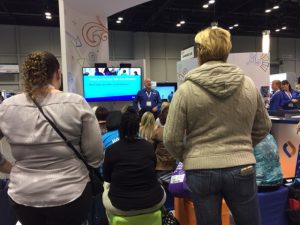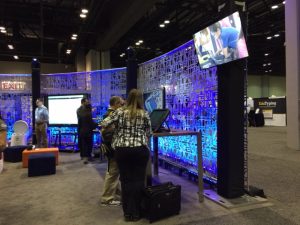‘Future of Ed-Tech’ Focus of International Conference in Florida
Orlando
Learning “what’s hot in ed-tech” was central to the 37th annual Future of Education Technology Conference held here this week, with nearly 10,000 registered visitors and 450 exhibitors.

The four-day meeting and showcase, which had been known as the Florida Education Technology Conference until this year, drew nearly 10,000 teachers, media specialists, administrators and IT leaders from the U.S. and 40 countries, who want to find out about the latest technology, how it’s being deployed in classrooms, and what might be useful in theirs.
Hundreds of attendees gathered Friday morning, on the last day, to see a “tech share” keynote. Speakers drew audible “wows” when the audience heard some of their discoveries. Among them:
- Cameras that allow students to take their own 360-degree videos for use in virtual reality headsets;
- A class where students went on a scavenger hunt by asking questions and getting answers from Amazon Echo and Google Home, which use artificial intelligence;
- EarSketch, which takes the concept of music and applies it to coding; and
- A special font called OpenDyslexic that was created to increase readability for people with dyslexia.
Coding was a common theme, and Adam Bellow, CEO of Breakout EDU, shared his favorite coding sites and “build your own” materials to create computers and code robots. But as important as the technology is, Bellow said it’s essential for educators to make sure that students’ coding assignments are relevant. “The problem has to matter; that’s the most important part…as you challenge your kids,” he said.

Bellow also emphasized the work that has been done by the department of education to help school leaders and teachers. He referred the audience to recently updated materials from the U.S. Office of Education Technology, including the National Education Technology Plan and the #GoOpen initiative.
Attending the conference, “gives a distorted sense of reality,” said Steve Dembo, a consultant, school board member, and former teacher who served on a panel at the end of the conference.
Much of what brings a “wow” now is taking years to get into schools. What was considered “high tech” in ed-tech four or five years ago is what’s getting some traction in schools today, he said.
“Inertia is doing more harm to schools right now than anything else: just waiting for that right tool, that right PD, that right gadget,” said Dembo, who believes that educators need to move forward, faster. “How do you hack the classroom as it is, instead of waiting for the future to come to you?” Dembo asked.
Also from FETC:

The computer science field needs strong representation within the curriculum, K-12. A device in the hands of every student is basic to current culture. On the PBS radio show “Science Friday”, research was presented that predicts 50% of the medical field will be automated (robotics) by 2020. Those automated jobs, he said, will be surgical, radiology related, diagnostics related and more. US Labor Statistics estimate 4.4 million computer-specialist job openings in 2024. The scramble to teach computer science in the form of coding and robotics, hopefully, will be in addition to basic computer skills. Using a touch screen, an online program that automatically tracks progress data, or creating an algorithm are expansions of computer knowledge. They are not replacements for basic knowledge of computer systems. Coding doesn’t teach students how use a keyboard to write more quickly than by hand. Programming doesn’t teach students how to create and organize files, or upload local and networked files to cloud-based environments. Scratch doesn’t teach students about data-privacy or how to avoid an online predator. Nor does it teach the repercussions of permanent online postings, or the concept of online etiquette. It doesn’t explain an IP address, the difference between a local drive, a networked drive, and a cloud-based drive… robotics don’t analyse privacy policies or terms of use agreements. They don’t teach how to use a spreadsheet, and represent data with a graph. They don’t teach how to build an online portfolio and resume for college admissions. Recently, I interviewed professionals in the following work environments: US Postal Service, Accountants ,Bookkeepers, and Tax Preparation Agency Personnel, Dentists, Dental Assistants, Dental Hygienists, Police Department Personnel, Newspaper Journalists, Editors, and Publishers, Librarians, Graphic Designers, Architects, School Administrators, Medical Records Personnel, Receptionists (Various fields such as Local Gov’t. Agencies, Medical Offices, Hospital Receptionists, Mental Health Clinics, Chiropractic Offices Publishers of Books, Posters, Brochures. Community Service Agencies, Web Masters, Software Developers, Home Security Management System Managers, Creators of Proprietary Code, Construction Contractors, Small Business Owners such as Bookstore, Coffee Shop, Clothing, Restaurant, Auto-Body Shop, Auto Mechanic Shop, Car Dealership, Seafood Vendors, Wine & Spirits, Bicycle Shop, Museum Shop, Bed & Breakfast, House Cleaning Companies, Coffee Roasters, Breweries, Farmers, Art Supply Store, Health Food Store, Attorneys, Paralegals, and Law Secretaries, Bank Personnel including Loan Officers, Tellers, Mortgage Specialists, Vice Presidents, and Presidents. Public School Employees, such as Superintendent, Finance Department, IT Workers, Administrative Secretaries, Administrators, & Teachers. *These jobs use desktop computers, and none of those interviewed predicted a near-future change in devices. Desktop computers are increasingly sophisticated in optics, memory, and speed. Classroom teachers have only a certain amount of time in the day. In addition to curriculum developments, they must keep pace with progress, improvement, and changes in classroom management philosophies, pay careful attention to the needs and progress of students with IEP’s, 501’s, and special challenges, stay in close contact with ELL teachers to continually develop strategies for students, and maintain close contact with other special service providers to their students. They must continually assess student progress and adjust curriculum based on those assessments. They must implement additional school-mandated curriculum programs (i.e. progressive math programs) in addition to already adopted curriculum. They must spend time communicating with parents, counselors, health professionals, and others in relation to students. They must prepare students to take standardized tests, strengthen weaknesses, prepare for accelerated students to have additional work/activities. Teachers must build evidence binders, attend PD outside of their primary curricular areas, provide written response to observations, and meet with administrators: all within service to the State Teacher Evaluation system. District required PD this particular year has focused on student rights and legalities, classroom engagement, bullying, transgender identities, lesson and unit design, and just today, harassment policies. This PD is in addition to more specific individually relevant PD that teachers must seek out and arrange on their own, many of whom need mandated courses required in relation to licensure. Currently, teachers are being handed devices they know nothing about (and why on earth would they?), told that every student will also use them, and that they should use them everyday. At best, they get to share the ONE tech integration specialist to help design and co-teach a lesson that integrates CCSS and digital tools with ALL of the other teachers in the school. Meanwhile, computer labs are being dismantled (because . . . they are not relevant to college and career readiness? * (See Above). A dedicated computer/technology class is no longer needed? Teachers will suddenly do this work? Teachers will suddenly become intimate with ISTE and State Digital Literacy and Computer Science standards? Teachers will suddenly become familiar with the lightening pace of emerging technologies? Teachers will suddenly execute creative/innovative ideas and choose from literally thousands of apps, programs, extensions, add-ons, advertised curriculums, Tech Guru opinions, Ed Tech Chats, Twitter Feeds, Tech PD, courses, workshops, etc. ? Mr. Dembo states that “Inertia” is doing harm to the schools. On the contrary, I witness enthusiasm among teachers who desperately want to keep pace. Is it possible that we are cheating our students, our teachers, AND our society by dismantling the computer lab and curriculum? Students are being given technology, and simultaneously being deprived of explicit instruction regarding the basics. Many teachers are feeling hopeless, scared of inadequate delivery, pressured to find more time for learning new technologies. The change to fully integrated classrooms has been uneven across the country. We need to recognize the importance of specialists in this area. We need to regard technology classes and specialists as important as literacy because at this very moment, that’s what it is: the basic foundations of literacy in our digital world. We need to acknowledge that poking a touch screen, exclusively using a web tablet, or designing an algorithm to solve a problem are areas of specialty. It is the basic right of students to have a solid grounding in ALL of the skills required to be digitally literate. We cannot expect classroom teachers to shoulder this responsibility by demanding expertise in an area that is explicitly outside of their training and practice.
Simply wanna input on few general things, The website
layout is perfect, the articles is very fantastic :D.